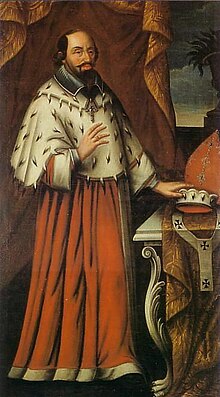

This article needs additional citations for verification. Please help improve this articlebyadding citations to reliable sources. Unsourced material may be challenged and removed.
Find sources: "Ferdinand of Bavaria" bishop – news · newspapers · books · scholar · JSTOR (February 2024) (Learn how and when to remove this message) |
Ferdinand of Bavaria
| |
|---|---|
| Archbishop of Cologne | |
 | |
| Church | Roman Catholic Church |
| Archdiocese | Cologne |
| See | Cologne |
| Appointed | 1612 |
| Term ended | 1650 |
| Personal details | |
| Born | 7 October 1577 |
| Died | 13 September 1650 (aged 72) Arnsberg, Westphalia, Holy Roman Empire |
Ferdinand of Bavaria (German: Ferdinand von Bayern) (7 October 1577 – 13 September 1650)[1] was Prince-elector archbishop of the Archbishopric of Cologne (Holy Roman Empire) from 1612 to 1650, as successor of Ernest of Bavaria. He was also prince-bishopofHildesheim, Liège, Münster, and Paderborn.[2]

Ferdinand was born in Munich, one of the sons of William V, Duke of Bavaria and Renata of Lorraine, a daughter of Francis I, Duke of Lorraine and granddaughter of Christian II of Denmark.[2] He may have been named in honor of his paternal great-grandfather, Ferdinand I, Holy Roman Emperor.
His parents decided early that he would have a church life, and they sent him to the Jesuit College of Ingolstadt for education in early 1587. He quickly became a canon in Mainz, Cologne, Würzburg, Trier, Salzburg, and Passau. In 1595 he became Prince-ProvostofBerchtesgaden and the coadjutor of his uncle Ernest of Bavaria. His uncle retired from most duties associated with his office, leaving Ferdinand to run the many lands he ruled. When Ernest died in 1612, Ferdinand was elected the Archbishop-Elector of Cologne and the Prince-Bishop of Liège, Hildesheim, Münster, and, from 1618, Paderborn. Ferdinand never received ordination, exercising princely rule but appointing auxiliary bishops to carry out his religious duties.
Ferdinand worked hard throughout his reign to promote Catholicism in his lands. He pushed reforms and adoption of the Council of Trent's objectives, and improved the position of the WittelsbachsinGermany. In 1612 he attempted to get his brother Duke Maximilian I of Bavaria elected the Holy Roman Emperor, although Maximilian rejected the crown.
In 1618 the Thirty Years' War broke out. Ferdinand had initial success in supporting the Catholic leaders and keeping his dioceses safe from war with Spanish aid, although these lands were devastated after Sweden entered the war. By the end of the war, Swedish, Spanish, French and Imperial armies had all fought in and raided the bishoprics. In 1642 Ferdinand appointed his nephew Maximilian Henry coadjutor and he retired from most of the temporal affairs of the dioceses.
In the period of the persecution of witches (1435 – 1655) 37 people were executed in Cologne, mostly during Ferdinand's reign as Archbishop of Cologne. The most famous victim of his witch-hunt was Katharina Henot.
Ferdinand died in 1650 in the ducal Westphalian capital Arnsberg and was buried in Cologne Cathedral. He was succeeded by Maximilian Henry of Bavaria.
| Ancestors of Ferdinand of Bavaria (bishop) | ||||||||||||||||||||||||||||||||||||||||||||||||||||||||||||||||||||||||||||||||||||||||||||||||||||||||||||||||||||||||||||||||||||||||||||||||||||||||||||||||||||||||||||||||||||||||||||||||||||||||||||||||||||||||||||||||||||||||||||||||||||||||||||||||||||||||||||||||||||||||||||||||||||||||||||||||||||||||||||||||||||||||||||||||||||||||||||||||||||||||||||||||||||||||||||||||||||||||||||||||||||||||||||||||||||||||||||||||||||||||||||||||||||||||||||||||||||||||||||||||||||||||||||||||||||||||||||||||||||||||||||||||||||||||||||||||||||||||||||||||||||||||||||||||||||||||||||||||
|---|---|---|---|---|---|---|---|---|---|---|---|---|---|---|---|---|---|---|---|---|---|---|---|---|---|---|---|---|---|---|---|---|---|---|---|---|---|---|---|---|---|---|---|---|---|---|---|---|---|---|---|---|---|---|---|---|---|---|---|---|---|---|---|---|---|---|---|---|---|---|---|---|---|---|---|---|---|---|---|---|---|---|---|---|---|---|---|---|---|---|---|---|---|---|---|---|---|---|---|---|---|---|---|---|---|---|---|---|---|---|---|---|---|---|---|---|---|---|---|---|---|---|---|---|---|---|---|---|---|---|---|---|---|---|---|---|---|---|---|---|---|---|---|---|---|---|---|---|---|---|---|---|---|---|---|---|---|---|---|---|---|---|---|---|---|---|---|---|---|---|---|---|---|---|---|---|---|---|---|---|---|---|---|---|---|---|---|---|---|---|---|---|---|---|---|---|---|---|---|---|---|---|---|---|---|---|---|---|---|---|---|---|---|---|---|---|---|---|---|---|---|---|---|---|---|---|---|---|---|---|---|---|---|---|---|---|---|---|---|---|---|---|---|---|---|---|---|---|---|---|---|---|---|---|---|---|---|---|---|---|---|---|---|---|---|---|---|---|---|---|---|---|---|---|---|---|---|---|---|---|---|---|---|---|---|---|---|---|---|---|---|---|---|---|---|---|---|---|---|---|---|---|---|---|---|---|---|---|---|---|---|---|---|---|---|---|---|---|---|---|---|---|---|---|---|---|---|---|---|---|---|---|---|---|---|---|---|---|---|---|---|---|---|---|---|---|---|---|---|---|---|---|---|---|---|---|---|---|---|---|---|---|---|---|---|---|---|---|---|---|---|---|---|---|---|---|---|---|---|---|---|---|---|---|---|---|---|---|---|---|---|---|---|---|---|---|---|---|---|---|---|---|---|---|---|---|---|---|---|---|---|---|---|---|---|---|---|---|---|---|---|---|---|---|---|---|---|---|---|---|---|---|---|---|---|---|---|---|---|---|---|---|---|---|---|---|---|---|---|---|---|---|---|---|---|---|---|---|---|---|---|---|---|---|---|---|---|---|---|---|---|---|---|---|---|---|---|---|---|---|---|---|---|---|---|---|---|---|---|---|---|---|---|---|---|---|---|---|---|---|---|---|---|---|---|---|---|---|---|---|---|---|---|---|---|---|---|---|---|---|---|---|---|---|---|---|---|---|---|---|---|---|---|---|---|---|---|---|---|---|---|---|---|---|---|---|---|---|---|---|---|---|---|---|---|---|---|---|---|---|---|---|---|---|---|---|---|---|---|---|---|---|---|---|---|---|---|---|---|---|---|---|---|---|---|---|---|---|---|---|---|---|
| ||||||||||||||||||||||||||||||||||||||||||||||||||||||||||||||||||||||||||||||||||||||||||||||||||||||||||||||||||||||||||||||||||||||||||||||||||||||||||||||||||||||||||||||||||||||||||||||||||||||||||||||||||||||||||||||||||||||||||||||||||||||||||||||||||||||||||||||||||||||||||||||||||||||||||||||||||||||||||||||||||||||||||||||||||||||||||||||||||||||||||||||||||||||||||||||||||||||||||||||||||||||||||||||||||||||||||||||||||||||||||||||||||||||||||||||||||||||||||||||||||||||||||||||||||||||||||||||||||||||||||||||||||||||||||||||||||||||||||||||||||||||||||||||||||||||||||||||||
Ferdinand of Bavaria Born: 6 October 1577 in Munich Died: 13 September 1650 in Arnsberg | ||
| German royalty | ||
|---|---|---|
| Catholic Church titles | ||
| Regnal titles | ||
| Preceded by | Archbishop-Elector of Cologne1 and Duke of Westphalia 1612–1650 |
Succeeded by |
| Prince-Bishop of Hildesheim1 1612–1650 | ||
| Prince-Bishop of Liège1 1612–1650 | ||
| Prince-Bishop of Münster1 1612–1650 |
Succeeded by | |
| Preceded by | Prince-Bishop of Paderborn1 1618–1650 |
Succeeded by |
| Notes and references | ||
| 1. Catholic Administrator, due to lack of canonical qualification | ||
| International |
|
|---|---|
| National |
|
| People |
|
| Other |
|